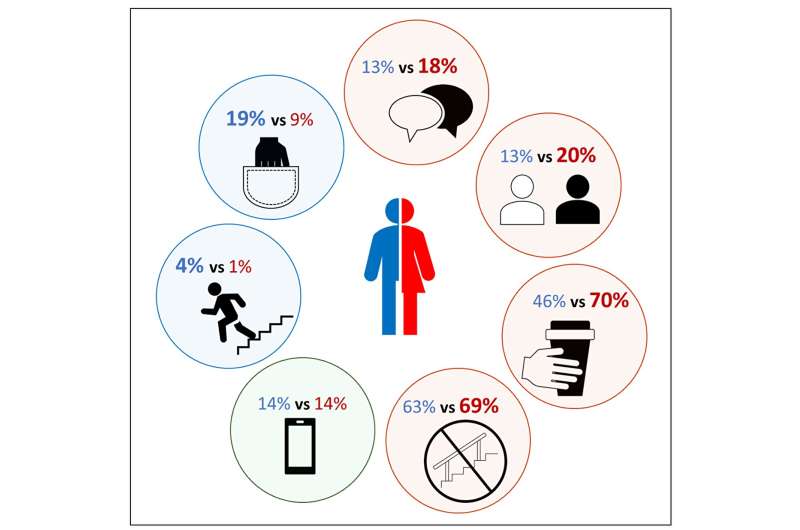This article has been reviewed according to Science X's editorial process and policies. Editors have highlighted the following attributes while ensuring the content's credibility:
fact-checked
peer-reviewed publication
trusted source
proofread
Young women may be more likely to engage in risky behavior when descending stairs than young men

Young women were more likely to engage in risky behavior like multitasking or conversation while descending stairs versus young men, according to an observational study of college students published July 26, 2023 in the open-access journal PLOS ONE by HyeYoung Cho and Shirley Rietdyk from Purdue University, U.S., and colleagues.
Falling on the stairs is more likely to result in injuries than other types of falls. In the U.S., three groups are most likely to fall on the stairs: children under three years, young adults in their 20s, and older adults over 85 years. In the young adult group specifically, women are injured 80% more often than men—the highest injury rate across all ages and sexes except for women in their eighties or above.
To identify risks for falling on the stairs and examine why young women sustain so many stair-related injuries compared to young men, the authors videotaped two indoor staircases on a U.S. university campus, one short (two-steps) and one long (17-steps) over the course of a semester.
They analyzed 2,400 young adults recorded on either the short staircase (52% of whom were women) or long staircase (29% of whom were women), and identified eight risky behaviors: no handrail use; not watching the stairs while descending; wearing sandals, flip-flops, or high heels; having an in-person or smartphone conversation; using an electronic device; hands in pockets; holding something; and skipping steps.
They also identified five participants who lost their balance, all of whom recovered: four were men, on the long staircase, and one was a woman, on the short staircase.
Women were significantly less likely to use the handrail (though no participants were recorded using the handrail of the short staircase), more likely to be holding something in their hands, more likely to be engaged in conversation, more likely to wear sandals and heels, and also demonstrated a higher number of co-occurring risky behaviors. However, women were less likely to skip steps and more likely to look at the stair tread during transition steps than men.
Previous research has shown that women tend to interact more closely with colleagues, presumably why so many of the people engaging in in-person conversations on the stairs were women. Overall, the results suggest that women are often multi-tasking and therefore possibly distracted while descending the stairs—and that this might be more dangerous than skipping steps or not looking at the stairs, the behaviors more often seen in young men in this study.
The authors add, "The young women we observed demonstrated more risky behaviors than the young men; future studies should also examine physiological differences that may lead to greater injury risk, such as differences in strength or reaction time."
More information: Cho H, Arnold AJ, Cui C, Yang Z, Becker T, Kulkarni A, et al. Risky behavior during stair descent for young adults: Differences in men versus women, PLoS ONE (2023). DOI: 10.1371/journal.pone.0288438 , journals.plos.org/plosone/arti … journal.pone.0288438




















